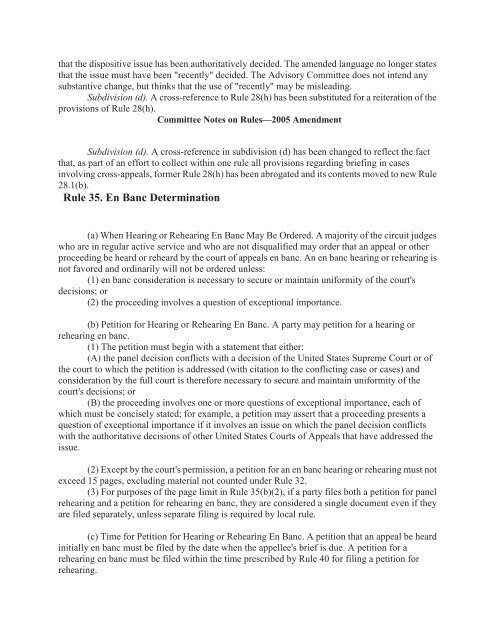Federal Rules of Appellate Procedure 2014-2015, 2014a
Federal Rules of Appellate Procedure 2014-2015, 2014a
Federal Rules of Appellate Procedure 2014-2015, 2014a
You also want an ePaper? Increase the reach of your titles
YUMPU automatically turns print PDFs into web optimized ePapers that Google loves.
that the dispositive issue has been authoritatively decided. The amended language no longer states<br />
that the issue must have been "recently" decided. The Advisory Committee does not intend any<br />
substantive change, but thinks that the use <strong>of</strong> "recently" may be misleading.<br />
Subdivision (d). A cross-reference to Rule 28(h) has been substituted for a reiteration <strong>of</strong> the<br />
provisions <strong>of</strong> Rule 28(h).<br />
Committee Notes on <strong>Rules</strong>—2005 Amendment<br />
Subdivision (d). A cross-reference in subdivision (d) has been changed to reflect the fact<br />
that, as part <strong>of</strong> an effort to collect within one rule all provisions regarding briefing in cases<br />
involving cross-appeals, former Rule 28(h) has been abrogated and its contents moved to new Rule<br />
28.1(b).<br />
Rule 35. En Banc Determination<br />
(a) When Hearing or Rehearing En Banc May Be Ordered. A majority <strong>of</strong> the circuit judges<br />
who are in regular active service and who are not disqualified may order that an appeal or other<br />
proceeding be heard or reheard by the court <strong>of</strong> appeals en banc. An en banc hearing or rehearing is<br />
not favored and ordinarily will not be ordered unless:<br />
(1) en banc consideration is necessary to secure or maintain uniformity <strong>of</strong> the court's<br />
decisions; or<br />
(2) the proceeding involves a question <strong>of</strong> exceptional importance.<br />
(b) Petition for Hearing or Rehearing En Banc. A party may petition for a hearing or<br />
rehearing en banc.<br />
(1) The petition must begin with a statement that either:<br />
(A) the panel decision conflicts with a decision <strong>of</strong> the United States Supreme Court or <strong>of</strong><br />
the court to which the petition is addressed (with citation to the conflicting case or cases) and<br />
consideration by the full court is therefore necessary to secure and maintain uniformity <strong>of</strong> the<br />
court's decisions; or<br />
(B) the proceeding involves one or more questions <strong>of</strong> exceptional importance, each <strong>of</strong><br />
which must be concisely stated; for example, a petition may assert that a proceeding presents a<br />
question <strong>of</strong> exceptional importance if it involves an issue on which the panel decision conflicts<br />
with the authoritative decisions <strong>of</strong> other United States Courts <strong>of</strong> Appeals that have addressed the<br />
issue.<br />
(2) Except by the court's permission, a petition for an en banc hearing or rehearing must not<br />
exceed 15 pages, excluding material not counted under Rule 32.<br />
(3) For purposes <strong>of</strong> the page limit in Rule 35(b)(2), if a party files both a petition for panel<br />
rehearing and a petition for rehearing en banc, they are considered a single document even if they<br />
are filed separately, unless separate filing is required by local rule.<br />
(c) Time for Petition for Hearing or Rehearing En Banc. A petition that an appeal be heard<br />
initially en banc must be filed by the date when the appellee's brief is due. A petition for a<br />
rehearing en banc must be filed within the time prescribed by Rule 40 for filing a petition for<br />
rehearing.


















